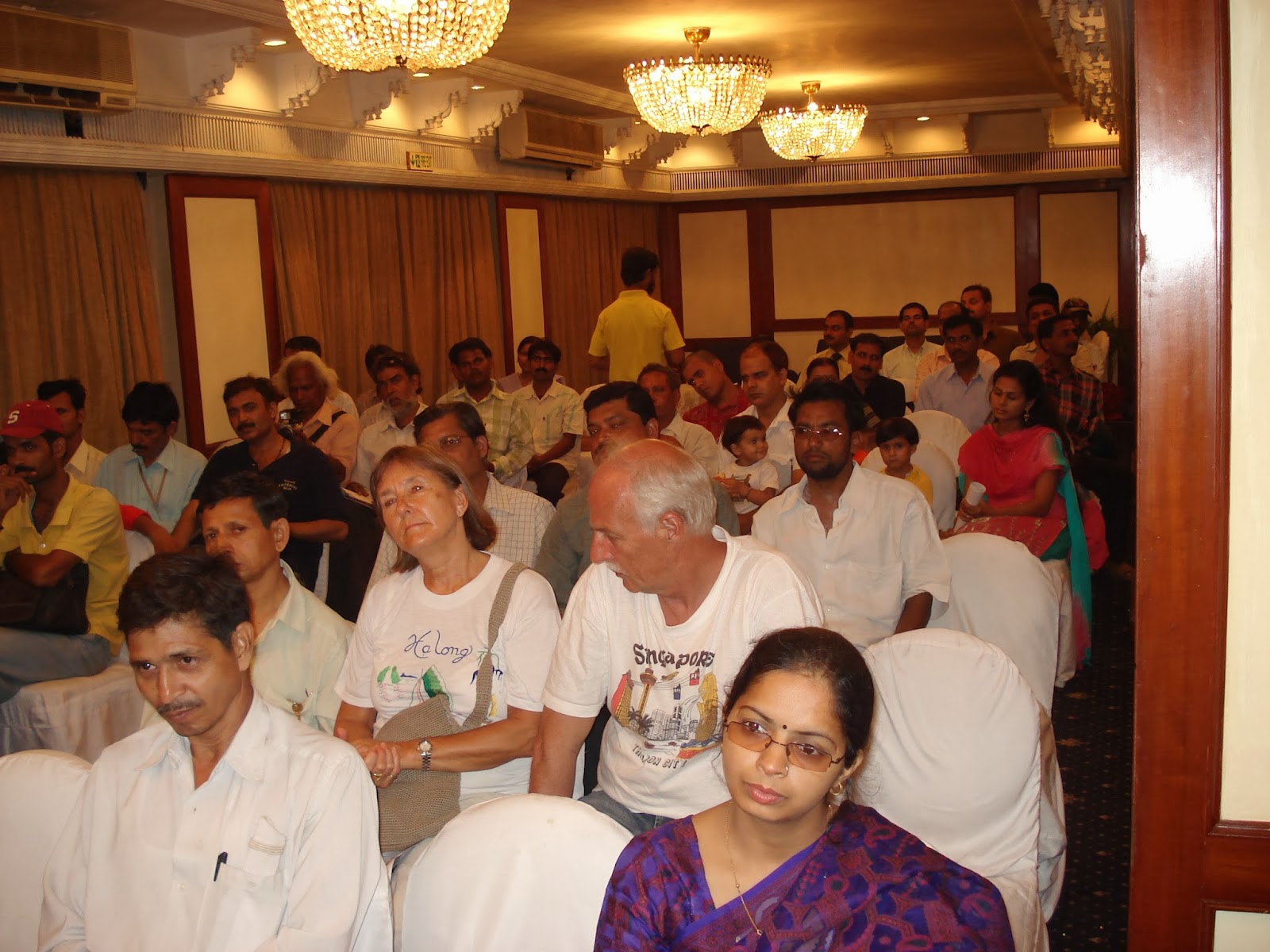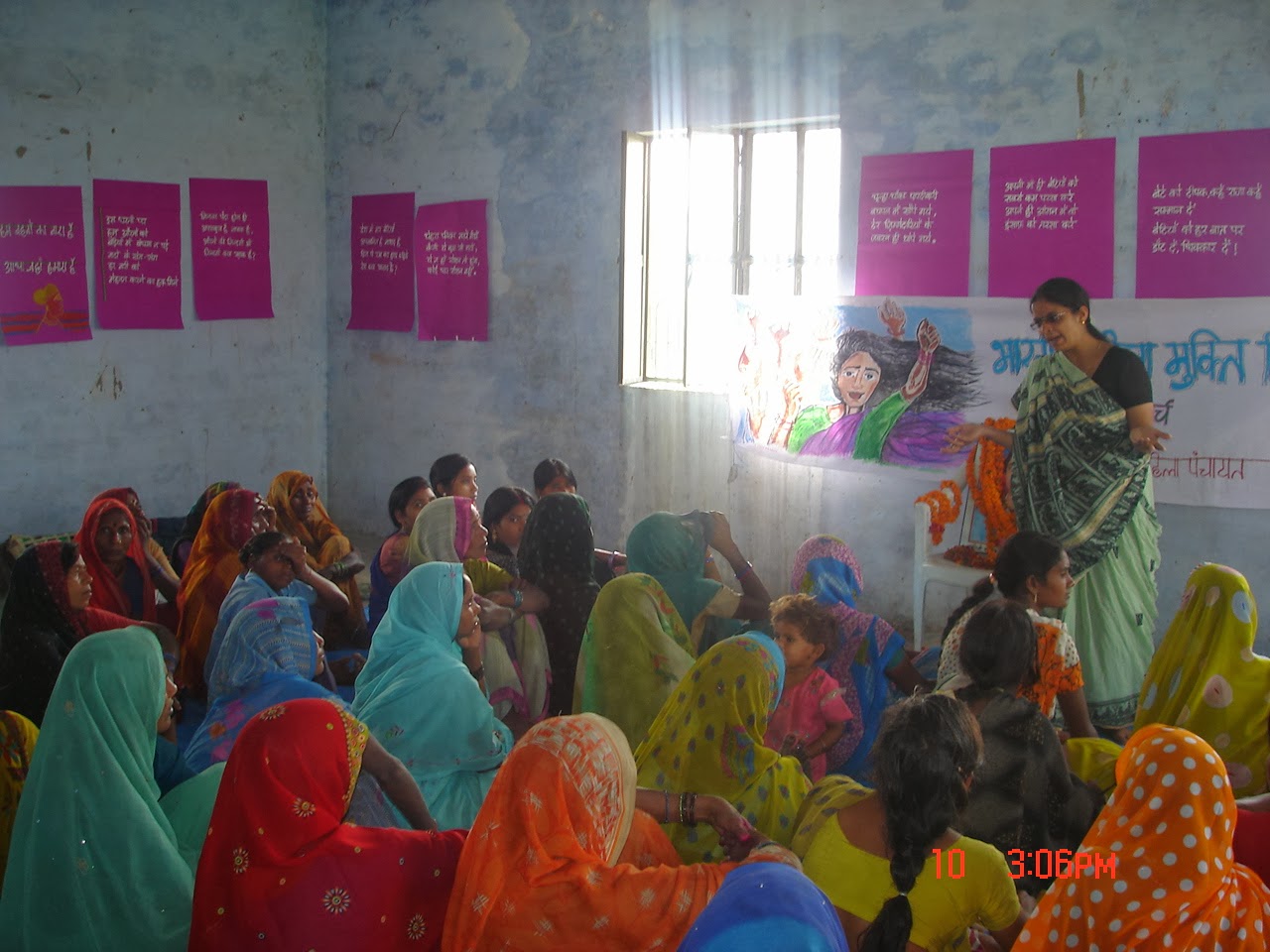Shruti Nagvanshi, born on 2nd
January 1975 in the city of Varanasi is an Indian social activist committed to
promote social justice and defend civil rights of the marginalised and vulnerable sections in
the caste ridden Indian society in order to overcome their social exclusion. She
brings to her work 15 years of direct experience with marginalised communities
mainly the untouchable caste known as Dalits, women and children in the eastern
part of Uttar Pradesh.
A dedicated social worker, Shruti
has been the District General Secretary of Bachpan Bachao Andolan (Save
Childhood Movement), a national movement against child labour from 1996 to 1997.
Shruti is the founder of Savitri Bai Phule Women’s Forum, a social organisation
which works for the empowerment of women members to fight against social evils
like caste and gender based discrimination and the Hindu conservative patriarchal
value system. The organisation draws inspiration from Savitri Ba Phule who was
the first Indian woman to become a teacher and founder of the first shelter
home for the battered women victims. When her husband died Savitri went against
the social traditions by accompanying the dead body and also lighted the pyre. The
Forum celebrates 10th March as Indian Women’s Day, as this is the death
anniversary of Savitri Ba Phule.

In 1999, Shruti became the founder trustee and
managing trustee of Jan Mitra Nyas (People Friendly Trust), the governing body of
People’s Vigilance Committee on Human Rights, (PVCHR) Varanasi. Jan Mitra Nyas
is a public charitable trust, for carrying out work on crucial issues of
governance and human rights in the adopted villages around Varanasi in Uttar
Pradesh. Shruti has been the co-initiator of Jan Mitra villages (People
Friendly Village), which works for the civil and political rights of vulnerable
Dalit community and focuses especially on issues related to women and children
based on the ideals enshrined the Universal Declaration of Human Rights of
United Nations Assembly of 1948.
People’s Vigilance Committee on
Human Rights, (PVCHR) was formed in 1996 in collaboration with famous Hindi
poet Gyanendra Pati, internationally well known Sarod maestro Vikash Maharaj,
Historian Dr. Mahendra Pratap Singh and Human Rights activist and her husband
Dr. Lenin. The approach of the organization is two-fold: to have a strong
grassroots organization to work for the democratic rights of those in
marginalized communities and secondly, to create the structure and dynamics to
receive the assistance of national and international institutions. PVCHR, a “peoples’ forum” is located in Varanasi
in the eastern region of Indian state of Uttar Pradesh. Though there has been a plethora of laws in
Indian constitution that prohibits the practice of treating people as
“untouchables” or subhuman for many decades, the practice still persists in
Indian society. PVCHR works as a guiding force to bring about social change.
During the past eleven years Shruti
with the help of the organisation has taken up around 3500 cases of
discrimination against women, children and Dalit community. Efforts of her
organisation have been able to secure interventions by the Government,
Commissions and administration (namely local panchayat administration) on almost
three hundred cases. Out of these some two hundred cases had positive results.
These are the cases taken up personally by her, besides many other cases taken
up on behalf of her organisation.
Shruti has been the convenor of
Voice of People, state wide joint alliance of civil society organisations working
for the promotion of children rights since October 2013. Shruti has also severed
on the District Food and Supply Advisory Committee of Varanasi as a member
appointed by Governor of Uttar Pradesh. In
recognition of her contribution, she has been awarded HT Women Appreciation
Certificate by the leading Indian daily English newspaper, The Hindustan Times.
Shruti has also been honoured by Shri P.L.Punia, Chairperson, National Commission
for Scheduled Castes and Scheduled Tribes for her commendable work for Dalit
rights.
Shruti participated in Gwangju
Human Rights Award ceremony in 2007 in South Korea along with her husband Dr.
Lenin who received 2007 Gwangju Human Rights Award from May 18 Foundation along
with Ms. Sharmila Irom of Manipur.
Shruti attended the Star Peace
award from Association for Communal Harmony in Asia (ACHA) in the US in 2008.
Shruti participated in International
Human Rights Award ceremony in 2010 in the City Council of Weimar in Germany.
Shruti has written many articles in
both Hindi and English languages. Her article about corporal punishment of
Dalit Mushar children in school of Pindara, Varanasi in India published in
sarokar.net and then published on editorial page of National Hindi daily
‘Jansatta’, which became a suo-motto petition and taken up by the High Court of
Uttar Pradesh. Intervention of High Court brought the justice and hope for the dalit
children.
PERSONAL DETAILS
Shruti was born and brought up in a
middle class family as the eldest child. Her father was employed with the Life
Insurance Company. She studied up to intermediate (Pre-University studies) at
Basant Kanya Vidyalaya founded by Annie Beasant of the Theosophical Society of
India. Since her childhood days, Shruti nourished the idea of a just and
equitable society and often used to get deeply disturbed by looking at the
existing social inequalities and exploitation and especially the widening gap between
the rich and the poor in her native city of Varanasi where poor people were often
forced to go to bed without food. Despite family opposition to her ideas, Shruti
took up the challenge to work and help the poor and the deprived.
Shruti got married to Dr. Lenin on
22 February, 1992. Despite all social pressures from her family, she daily
walked two kilometres to Uday Pratap College and completed her graduation. Mother
of a boy child, Shruti is also an example of someone who has balanced her work
life with family life exceptionally well. Her life is a shining example of
working for the society selflessly and making the best use of knowledge for the
civil and political rights of the less privileged sections of the society.
Born on 2 January 1975 at Varanasi
Married to Lenin Raghuvanshi on 22 February 1992; has a 15 year old
son, Kabeer Karunik
1993: District General Secretary of Bachapan Bachao Andolan (Save
the Childhood Movement), Varanasi.
1996: Founded People's Vigilance Committee on Human Rights
(PVCHR) along with Lenin Raghuvanshi, in association with Dr. Mahendra Pratap
(Historian), Vikash Maharaj (Musician), GyanedraPati (poet) to work on child
labour free village.
1999: Founded Jan Mitra Nyas, a public charitable trust, for
carrying out work on crucial issues of governance and Human Rights in five
adopted villages near Varanasi in Uttar Pradesh.
2001: Elected to the Executive Council of Voice of People (VOP,
25000 membership), a state wide people's alliance to highlight and bring into
national focus the child right in Uttar Pradesh.
2002: Campaigned and mobilized at State and national level for
prevention of torture.
2004: Created Model Village "people Friendly Village"
to enable and amplify the voice of the marginalized with especial focus on realization on child
right in field.
2003: Established Savitri Bai Phule Mahila Panchayat, a women forum
http://dalitwomen.blogspot.in/
2004: Organized Benaras Convention in order to assert the
discourse on the politics of marginalized people in the national mainstream.
The convention attended by thinkers and activists across the nation unanimously
declared that the City of Varanasi was the symbol of Shraman Sanskriti (culture
of the working classes) as opposed to that of the Brahminical Sanskriti
(Culture of the feudal classes).
2005: Conceived and convened People's SAARC at Varanasi in Uttar
Pradesh. The objective was to bring the issues faced by the people of SAARC
countries on to a common platform and forge a forum based on people to people
relationship to fight against the evil designs of caste, communal, ethnic, and
fascist forces in the region. The most important declaration read, "We
cherish and uphold the Rule of Law, sovereignty of the people, a system of
governance that ensures devolution of power, People' right to self-rule and
control over resources." The core committee comprised of PVCHR (India),
INSEC (Nepal), People's Forum for Human Rights (Bhutan), Human Rights
Commission of Pakistan, LOKOJ (Bangladesh) and Wiroslokh Institute
(Srilanka).This convention also triggered off a series of similar conventions
across the SAARC countries. Two major outcomes of the convention were the
inclusion of Afghanistan in the SAARC, and the inclusion of civil society
voices in the decision making process adopted in the Dhaka declaration in
SAARC, 2005.
2007: Established Folk School for Dalits in Belwa region.
2007: PVCHR and Association for Democratic Reforms (ADR) along
with 210 NGOs across the state conducted the Uttar Pradesh Election Watch
(UPEW). The objective was to sensitize the electors about the governance
processes. By providing background information of the candidates, UPEW
facilitated for the citizens of Uttar Pradesh to make informed choices.
2007: Participated in 2007 Gwangju Human Rights Award of May 18
Foundation of South Korea.
2010: Participated in 2010 International Human Rights Award ceremony
at City council of Weimar in Germany.
2011: Received Usmania Award from Madarsa Usmania, Bazardiha,
Varanasi in India for the development and welfare of education.
2012: Jan Mitra Nyas, a public charitable trust for PVCHR received
ISO 9001: 2008 Certification for quality management system.
2013: Convenor of Voice of People(VOP)
Contact: SA 4/2 A, Daualtpur, Varanasi-221002, India
Mobile: +91-9935599331/0




.jpg)







.jpg)
.jpg)






.jpg)




























